AGPX Game Maker v2.2.1
A downloadable tool for Windows
"AGPX Game Maker" is a tool that allows you to generate C++ source code for simple video games. This new tool allows you to use a simple BASIC language to make the code (whose guide can be found in the .zip file in English and Italian).
The binary (.prg) file must be generated by downloading external C++ compilers (from the respective author's site) and currently only Oscar64 and LLVM-MOS are directly supported (but others may be added in the future).
To install the tool, please watch the following video:
Introduction to AGPX Game Maker (English version)
Introduzione al AGPX Game Maker (Italian version)
Link to Oscar64 release:
The most recent version of Oscar64 which seems to work the best with AGPX Game Maker (at least, according to my tests) is the v1.31.262:
https://github.com/drmortalwombat/oscar64/releases/tag/v1.31.262
Link to LLVM-MOS release:
https://github.com/llvm-mos/llvm-mos-sdk#getting-started
N.B.:
- there is no need to manually run external compilers, the tool automates the invocation.
DISCLAIMER (please read carefully):
This tool has limitations (in terms of performance, available memory and C64 features) and may contain bugs (as well as external compilers used) and so may not be suitable for your particular project, please carefully evaluate if it's the right tool for you. It's made for fun and it's free of charge for any use. You are authorized to use it only if you read and fully agree with the license (please read the guide and especially the "Troubleshooting" section in case of problems).
Please note that the authors of the external C/C++ compilers are not involved in this project and are obviously not required to fix any bugs in their compilers to make "AGPX Game Maker" work. So if you have any issues, please file a bug at https://github.com/AGPX/AGPXGameMaker/issues and if the issue is related to external compilers, I will try to contact them, but again I can't guarantee anything (see the guide for more details on how to report bugs).
In no case, I can fix external compilers, as I don't have the skills to do so.
For a full explanation of the tool (including a step-by-step tutorial on how to make a game with it), check out my playlists:
AGPX Game Maker (English version)
AGPX Game Maker (Italian version)
Inside the 'examples' directory, among other examples, you can find 6 demos: "Space Pong", "Snakes", "The Runner", "Legacy Of The Lost Spell", "Blazar-X" and "Desert and Treasures" (fully commented in English and Italian).
Note: the implementation of the LZO algorithm is courtesy of DrMortalWombat, see Oscar64 for details on the decompression algorithm.
Features list of the v2.2.1:
- MDI Application;
- Supported characters mode: Standard Character Mode (SCM), Multi Color Mode (MCM), Extended background Color Mode (ECM) with exporter for assembly and basic;
- Supported sprites mode: monocolor, multicolor with exporter for assembly and basic;
- Supported bitmap cells (named "Blockset") with mode: monocolor, multicolor (you can also use it to import a full screen bitmap, BUT be aware that there is no proper fullscreen bitmap editor inside the software, the blockset are treated just like characters);
- Editing of multiple characters/sprites/blocks displaced in a grid (with ability to mix mono and multicolor characters);
- Editing tool:
- Up to 4 Layers;
- transformation: shifting, rotation, resizing, invert, mirror, flip (you can restrict them to the selection);
- drawing tool: freehand, line, ellipse, rectangle, floodfill (clipped to the selection, if any). Possibility to use two colors dithering.
- selection: irregular shape, move selected area, copy & paste;
- Import images to characters (SCM, MCM or ECM), sprites (mono or multi) or blocks (mono or multi) with automatic search of the best fitting colors and dithering support (import can take a while, please fix at least the background color to speedup the operation);
- Import/Export of data and project items;
- Animation editor for characters, sprites and blocks with "ghost" functionality;
- Characters/sprites/blocks optimization: remove unused, empty and duplicates (with cascading update);
- Unified clipboard between sprites, characters and blocks ('cut' also updated tiles, screens and animations);
- Drag & Drop (between characters, tiles and blocks);
- Possibility to add a background/foreground image (with adjustable position and size) useful to perform decaling;
- Zoom/Pan;
- 100 levels of undo/redo;
- Tiles editor (characters or blocks based);
- Screens editor (characters, blocks or tiles based);
- RLE and LZO compression;
- Includes a simple BASIC language that is transpiled to C/C++;
- Provides a programming model based on state-machines;
- Provides a sprite abstraction called "Actors";
- Provides the definition of paths for the actors;
- Provides the definition of map of actors;
- Provides the definition of "Levels";
- Provides the definition of "Games";
- Provides sound effects through the SidSFX Editor version 0.1.1 or higher;
- Provides multi-directional (8-way) scrolling;
- Allows import of external data/routines (like music routines);
- Support multiplexer up to 32 sprites;
- Support for disk I/O;
- VIC-II Calculator;
LICENSE:
Permission is hereby granted, to any person obtaining a legal, unmodified, copy of this software and associated documentation files (the "Software"), to use the Software, including for commercial purposes without any obligation to pay fees to the author, but **not** to modify, redistribute and/or sell copies of the Software without explicit written permission from the author, subject to the following conditions:
The above copyright notice and this permission notice shall be included in all copies or substantial portions of the Software.
THIS SOFTWARE IS PROVIDED "AS IS" WITHOUT WARRANTY OF ANY KIND, EXPRESS OR IMPLIED, INCLUDING, BUT NOT LIMITED TO THE WARRANTIES OF MERCHANTABILITY, FITNESS FOR A PARTICULAR PURPOSE AND NON-INFRINGEMENT. IN NO EVENT SHALL THE COPYRIGHT OWNER OR CONTRIBUTORS BE LIABLE FOR ANY DIRECT, INDIRECT, INCIDENTAL, SPECIAL, EXEMPLARY, OR CONSEQUENTIAL DAMAGES (INCLUDING, BUT NOT LIMITED TO, PROCUREMENT OF SUBSTITUTE GOODS OR SERVICES; LOSS OF USE, DATA, OR PROFITS; OR BUSINESS INTERRUPTION; OR THE INABILITY TO USE THE SOFTWARE IN THE PRESENT OR FUTURE) HOWEVER CAUSED AND ON ANY THEORY OF LIABILITY, WHETHER IN CONTRACT, STRICT LIABILITY, OR TORT (INCLUDING NEGLIGENCE OR OTHERWISE) ARISING IN ANY WAY OUT OF THE USE OF THIS SOFTWARE, EVEN IF ADVISED OF THE POSSIBILITY OF SUCH DAMAGE.
FURTHERMORE, THE AUTHOR IS NOT RESPONSIBLE FOR ANY PROBLEMS ARISING FROM ISSUES IN EXTERNAL TOOLS THAT THE SOFTWARE USES, FROM THE EVENTUAL DISCONTINUATION OF THE SAME, OR FROM ANY OTHER CAUSE THAT MAY AFFECT THE FUNCTIONING OF THE SOFTWARE OR YOUR PROJECT. THE USE OF THIS SOFTWARE IS AT THE SOLE RISK OF THE USER, WHO ASSUMES ALL RESPONSIBILITY FOR ANY DAMAGE AND/OR LOSS OF ANY NATURE.
THIS TOOL HAS LIMITATIONS (IN TERMS OF PERFORMANCE, AVAILABLE MEMORY AND C64 FEATURES) AND MAY CONTAIN BUGS (AS WELL AS EXTERNAL COMPILERS USED) AND SO MAY NOT BE SUITABLE FOR YOUR PARTICULAR PROJECT, PLEASE CAREFULLY EVALUATE IF IT'S THE RIGHT TOOL FOR YOU. YOU ARE AUTHORIZED TO USE IT ONLY IF YOU HAVE READ AND FULLY AGREE WITH THIS LICENSE AND IF YOU RELEASE THE AUTHOR FROM ANY LIABILITY OF ANY KIND.
RELEASE NOTES:
V2.2.1 (Jul 10, 2025):
- fixed a severe issue with the "ENABLE IO" instruction that caused the program to freeze when the LZO algorithm was used;
V2.2.0 (Jun 29, 2025):
- improved naming of the generated file .prg;
- added I/O instructions to read/write to disk (added the "Disk" demo);
- added ability to build a .D64 starting, from a blank disk or an existing .D64;
- improved compatibility with the latest version of Oscar64;
- fixed a bug in the ActorsMap related to an incorrect enumeration of Actors (in some cases);
- fixed a bug in the ActorsMap and Screen editors that reversed the drawing order of actor sprites;
V2.1.2 (Jun 03, 2025):
- added "Multiload" demo;
- fixed and improved the RUN command;
- added a chapter in the manual on how to load and run a program;
- bug fix: fixed "Legacy Of The Lost Spell" demo to better handle animated characters (moved block deletion);
- bug fix: allowed the declaration of a ActorList locally with DIM;
- errata corrige: renamed "getX" and "getY" to "getCX" and "getCY";
- errata corrige: improved the "Animated Characters"/"Caratteri Animati" paragraph by removing the invocation of "bc.save()" (not necessary because it's automatically invoked by other functions);
V2.1.1 (May 19, 2025):
- added MOVE SCROLL TO statement to move the scroll window to a specified position in pixels;
- added the ability to invoke UPDATE MAP also among global functions;
V2.1.0 (May 18, 2025):
- BREAKING CHANGE: The scroll window update and the automatic scrolling of actors are now done with a new specific new instruction: "PREPARE SCROLL"
To update from V2.0.3 to V2.1.0, you must add this instruction before the "UPDATE BACKBUFFER".
In addition, any call to "SETUP SPRITES", must happen after "PREPARE SCROLL". See the new "Desert'n'Treasures" demo for an example (in the game's global declaration). All demos and the manual have been updated. - added a 8-way scrolling demo: "Desert'n'Treasures" (during the game you can press the space key to look down);
- added "TwoCharsets" demo to demonstrate how to create a split screen using 2 different character sets;
- bug fix: fixed a major alignment bug that in some circumstances caused Oscar64 to generate incorrect code;
- bug fix: fixed the problem that caused the game engine to allocate sprites in reserved areas (from "Extra Data");
- bug fix: BLANK ON and BLANK OFF now work also when scrolling is enabled;
- bug fix: added CURRENT keyword in the highlighter;
- updated manual: added a paragraph for scrolling repositioning;
- updated manual: improved the paragraph "WAIT UNTIL SCROLLING HAS STOPPED";
V2.0.3 (May 05, 2025):
PLEASE DOWNLOAD **AGAIN** THE LATEST VERSION OF Oscar64 as it contains an important bug fix!
- added re-fit button to recompute the hit-rectangle;
- added .id in the Actor;
- added "{Actor} IS ActorClass" instruction to check whether a generic ActorRef is an instance of a specific Actor;
- added "Breakout" example;
- improved help and manual on HITHW instruction;
- bug fix: fixed a bug with the setup of charset for screen with scrolling;
- bug fix: fixed missing selection rectangle around actors in ActorsMapEditor, when no screen is selected;
- bug fix: removed THEN function when another animation is setup;
- bug fix: made SHRCHRS and SHLCHRS available also when scrolling is not enabled;
- bug fix: fill selected cells of ScreenEditor now works again;
- bug fix: fixed a bug in the USE SCREEN MAP when no ActorsMap is associated to the screen;
V2.0.2 (April 26, 2025):
- improvement: removed sprite setup in SETSCROLLREGS instruction. Must now be called manually via SETUP SPRITES. This fixes the rhino/trunk issue in "The Legacy Of Lost Spell" demo for both PAL and NTSC systems.
- minor corrections in the manuals.
- added missing dll (for the svg icons).
V2.0.1 (April 25, 2025):
- fixed a regression in the ANIMATE instruction;
- added missing "Parallax" example;
V2.0.0 (April 25, 2025):
- added 109 new instructions;
- added generic "Actor" reference type;
- added the attribute "tag" (byte) to Actors;
- added ActorList;
- added ActorPool;
- added multi-directional scrolling 2x2 and 4x4 (supported only by Oscar64 in this first release);
- added fully 16 bits sprites coordinates (with clipping);
- added auto scrolling of the Actors;
- added ActorsMap with possibility to update it;
- added Path Editor;
- added UPDATE SCREEN and RESTORE SCREEN to modify and restore a screen (including screen with scrolling);
- added support of the fixed point for the STR instruction.
- added PRINTG to print blockset text in hires mode (mono and multicolor);
- added ability to copy ROM characters even in blocksets (useful for PRINTG);
- added a label in each editor showing the name of the open resource;
- added the ability to click an error and go directly to the code;
- added pick of the cell in Screen Editor with the Ctrl (when the drawing tool is enabled);
- added frame numeration and spinner in Actor Editor;
- added shortcut in Tileset editor to swap from Tile (T) and Char/Block mode (C). Add also a shortcut for deleting selection (Del);
- added Selection (S), Flood fill (F), Clear selection (Del) shortcut in Screen Editor;
- added BlockChars to animate a group of moving characters on the screen (including scrolling screen);
- added parallax scrolling instructions;
- added SID instructions;
- added Actor visibility and priority flags;
- added CTRL + / to comment/uncomment a line or selected lines;
- added "Blazar-X" demo;
- added "Legacy Of The Lost Spell" demo;
- added "Parallax" demo;
- improved HOME button behavior in the code editor;
- improved MOVE TO/MOVE BY speed;
- updated the demo "The Runner" (the pick of objects is simplified by the UPDATE SCREEN instruction);
- fixed highlighter (underscore detection was missing);
- fixed type check when operators are an integer and a fixed-point number (now reports an error);
- fixed a crash condition in the Screen Editor;
- fixed an issue where frames in actor animations would not relocated when a frame was deleted;
- fixed a bug when a new animation is set in a THEN statement of the ANIMATE;
- fixed a bug in Actor reset that left the previous THEN running!
- fixed several bugs in the multiplexer that caused flickering!
- fixed a bug in code generation when a code resource (Actor/Level/Game) has a name that is a subsequence of another;
V1.5.5 (January 17, 2025):
- fixed a bug in the MIRROR instruction when sprites are in reserved memory areas;
- preserved the state of the current window when "cut" is performed;
- fixed rendering of the mirror axis in the Actor editor;
V1.5.4 (January 11, 2025):
- improved multiplexer stability;
- multiplexer bug fixing;
V1.5.3 (December 24, 2024):
- Reduced flickering in multiplexer;
- Bug fix: fixed a bug when the priority multiplexing is enabled (which made the sprites disappear);
- Changed string color in dark mode (it was a too dark red, now it's like the normal text);
V1.5.2 (December 23, 2024):
- Bug fix: removed multiplexer code that was erroneously emitted when multiplexer was not enabled;
V1.5.1 (December 23, 2024):
- Added missing file for the multiplexer (LLVM-MOS);
V1.5.0 (December 22, 2024):
- Added sprite multiplexer (with a demo called "Multiplexer");
- In ScreenEditor you can now select a cell with both the left and right mouse button and use them to draw with pencil or filler;
- In Charset/Spriteset and Blockset:
- you can now clear the selected slots with the "delete" key;
- in multicolor mode, you can select the left color with Ctrl+B/1/2/R and the right color with Alt+B/1/2/R;
- In Charset/Spriteset, added the possibility to import and export binary raw data;
- Added auto capitalization of keywords;
- Fixed a bug where when updating a sprite's mono/multicolor mode, the updates were not applied to the Actor(s) in the executable;
- Fixed a bug that highlight keywords inside strings;
v1.0.6 (December 05, 2024):
- Improved tiling of the windows;
- Improved resizing and scaling of the UI;
v1.0.5 (November 30, 2024):
- Added the Actor/background test through the hardware register;
v1.0.4 (November 29, 2024):
- Added ability to open a file from the command line;
- Fixed an issue with the char.rom and the compilers when the current working directory is not the one of the executable (for e.g. when the extension .gmk64 is associated to the executable and a .gmk64 file is double clicked);
- Allow scaling of the UI below 100% and up to 200% (see File > Settings... menu');
- Fixed regression that doesn't show the C++ compiler error messages;
v1.0.3 (November 22, 2024):
- Fixed font scaling on Windows 10;
v1.0.2 (November 17, 2024):
- Added support for the Windows dark mode;
- Added scaling factor in the setting to enlarge the UI;
- Fixed additional issues with VICE 3.6.1, 3.5 and 3.2;
v1.0.1 (November 15, 2024):
- Fixed an issue with VICE 3.7;
v1.0.0 (November 14, 2024):
- FIRST PUBLIC RELEASE.
| Updated | 6 days ago |
| Status | Released |
| Category | Tool |
| Platforms | Windows |
| Rating | Rated 5.0 out of 5 stars (5 total ratings) |
| Author | AGPX |
| Tags | agpx, basic, Commodore 64, game, maker, programming |
Download
Install instructions
To install the tool:
- unzip the file in a folder;
- eventually run the .exe 'VC_redist.x64.exe' to install the Microsoft Visual Studio redistributable;
- download at least one external C/C++ compiler (I suggest to download both);
- open the tool and from the menu 'File > Settings...' you can configure the path of the external C/C++ compilers (and others things);
For details on installation see the manual and the following tutorials:
Introduction to AGPX Game Maker (English version)
Introduzione al AGPX Game Maker (Italian version)
Development log
- Fixed severe I/O issue.6 days ago
- Description updated with the most suitable version of Oscar64.15 days ago
- AGPX Game Maker v2.2.016 days ago
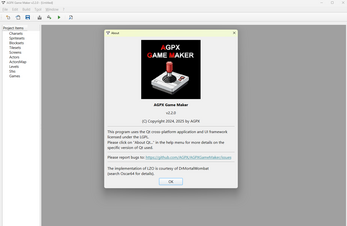
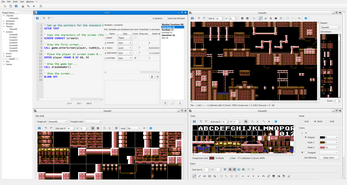
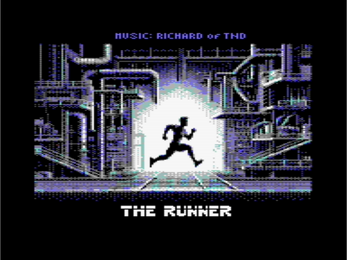
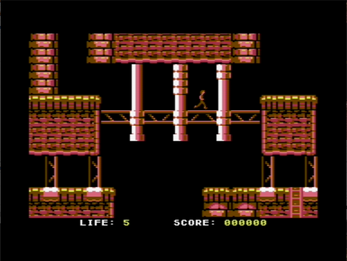
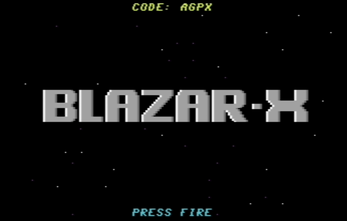
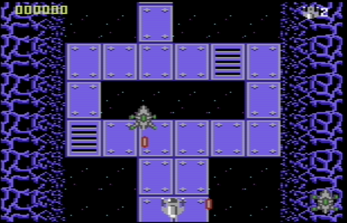
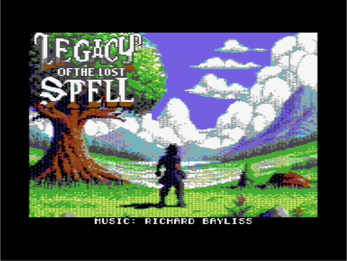
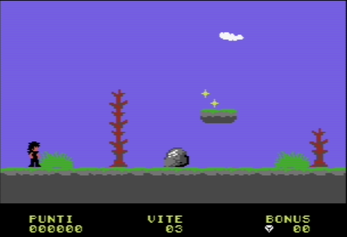
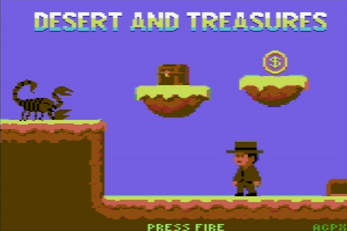
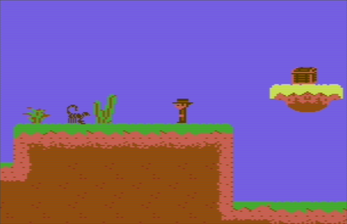
Comments
Log in with itch.io to leave a comment.
A 32 bits version would be good
What’s the best way (email) to contact you about something?
Any chance for a feature that wraps up game and emulator as a stand-alone executable for Windows? Bonus points for Linux and HTML5 (neat for Itch io live demos).
Hi AGPX, i'm trying to implement the music routine but haven't been successful so far. Do you explain it in any of your videos? Thanks!
You are right, I have not explained it in any tutorial. You can find an example in the demo "The Runner". In essence the steps are:
1) Import the routine that plays the music in the "Extra Data" of the game, being careful to choose a suitable address (usually under $C000) for the music (the address must be chosen by the music program that exports the routine);
2) Call (with the SYS instruction), the initialization routine of the routine that plays the music;
3) Call (again with SYS), the routine that plays the music from a raster interrupt;
Hi AGPX and thanks for answering, if I already managed to make the music work in the game, the PRG was badly generating in the Music Studio without the player. Now I make you a new consultation, how do I have two sids in the game? One for the presentation screen and one for the Music Ingame😁
Hi AGPX, I've already congratulated you through other means but I'm taking the opportunity to do it here. The engine is wonderful. I've been working with it for a few weeks now and as I always do when I use a new language or engine, I'm starting to port one of my games to gain experience.
Right now I'm porting one of the Atari 2600 games but I got stuck on something stupid. I need to generate a random number between 0 and 15 and the manual contains the RND command that generates from 0 to 65535, but I don't know how to limit it to the 16 values I need.
Can you help me please?😁
Being 15 a power of 2 minus 1 (2^4-1) you can use AND: (RND AND 15), otherwise you need the modulo: (RND MOD 28) // from 0 to 27.
Prefer the AND when you can, because MOD perform a division and it's by far more heavy.
Ok, thanks a lot, I'll try it in my game!👌
Hey there! I just wanted to say congrats on your awesome work! As a huge 80s fan, it’s incredible to be able to write games for C64 in such a simple and intuitive way. I had a small question though. I use a Mac and I managed to get all your programs to run on it using Wine, but I couldn’t get them to work on virtualized Windows on both Silicon and Intel Macs. The program doesn’t seem to start on virtualized Windows 11. It would be really helpful if it also worked in virtualization because Rosetta will be discontinued in 2 years and Wine uses Rosetta. Anyway, thanks again for your incredible work, dedication, and expertise!
Sorry, but I don't own a Mac and can't do any testing.
I managed to get it working even on Windows 11 running in a virtual machine on an Intel Mac. But unfortunately, it doesn’t work on Mac Silicon. It seems like there might be a compatibility issue with Intel VT-x instructions, but I’m not entirely sure. Thanks again for all your hard work!
I use AVX instructions.
Yes I had noticed it! I suppose the problem is that the virtual machine on Apple Silicon does not support AVX instructions, or maybe only partially supports them. Thanks again for your help, your work is really fantastic!
Works if you are running Windows 11 27744 or higher in your VM. Which includes AVX emulation on ARM. See https://blogs.windows.com/windows-insider/2024/11/06/announcing-windows-11-insider-preview-build-27744-canary-channel/
El Cartero huh ? then this thing got options, im not sure why you cant include the compilers into your package for single download and im not gonna ask but maybe could you provide a direct link to one or both together with this here ? when i google "LLVM-MOS" i get quite a lot of pages
I added the 2 links in the description.
Ciao Vorrei innanzitutto farti i miei complimenti per lo splendido programma che hai creato. Ma vorrei anche farti una domanda. E possibile accedere al floppy o alla cassetta per salvare dei dati per esempio lo stato attuale del gioco e riprenderlo successivamente ? Oppure per salvare il punteggio e il nome. O magari per accedere a dei livelli successivi salvati sul floppy. Grazie
Ti annuncio che nella versione 2.2.0, ho supportato l'accesso al disco (ho anche rilasciato un demo e un video tutorial).
I have a bug, in the setting when it's time to set-up the sid SFX path , I go to the folder, and i only see folder it's imposible to see the .exe and oder file. i only see folder empty. i have install all the latess version.
It's normal, for SidSFX you've to select only the folder.
Thanks
Nice!
Is there a Discord channel? I am seriously trying to understand this software and need a channel where I can live and ask questions on the coding side.
Hi, I'll try to take a look at it between my projects. I just wanted to ask if this tool can also be used to program the game in assembly?
Pinov Vox
Voxvideogame&Co
VG
No, it's not currently possible to use assembly directly in BASIC code. It's possible to import external routines (.prg) through the "Extra data" section of the game (such as music generated with trackers). However, the Oscar64 compiler can produce highly optimized 6502 code.
Possible to do Linux version please?
Have you tried the latest version of Wine? I've been told it works with that.
Yes, it runs, but it requires all the external utilities and compilers to also be windows.
any plan for multi disks or multi files games?
Multi files games is already supported, I'll do some tutorial on it. But in the future, I hope to add .crt support, to have by far more memory.
ohh, i see! great news. thx
Awesome!
nice work! i love it, you are amazing!
Ciao, una domanda. Con la versione 1.5 o 2.0 è/sarà possibile gestire il depth di un oggetto, ovvero fare in modo che l'eroe passi o davanti o dietro ad esempio un comodino o una staccionata?
Ciao, proverò a supportarlo nella 2.0, altrimenti in una versione successiva.
Grazie!
Se aggiungi anche la REU, come diceva qualcuno "siamo a cavallo"
Any plan to allow developing in C/C++ directly?
I.e. use the editors, build environment and maybe some library/glue code, but not the basic dialect?
Sorry, no plan for it.
Muchas gracias por crear esta maravillosa herramienta, para crear juegos para Commodore 64, recientemente hemos creado el juego "El Cartero" y estamos muy felices por ello!!. Gran saludo para ti!!
El Cartero is finished, made with c64 game maker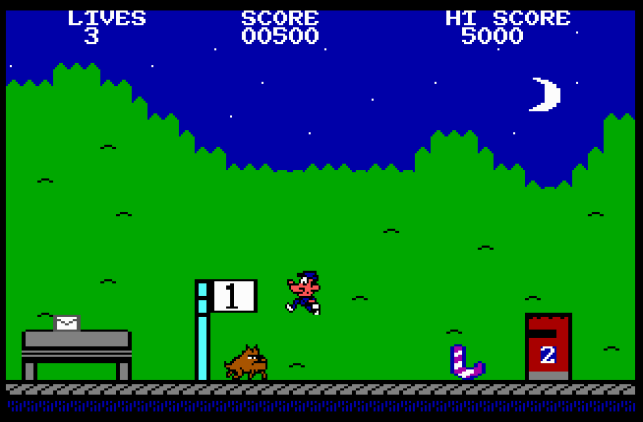
Thanks, that's nice to know! Looks good, I'm curious. Do you have any videos where I can see it in action?
Good job!
Thanks
Thanks for this tool i really enjoy working with it makes it much easier to make c64 games hope you keep working on it
Thanks, I'm working hard on version 2.0, which will introduce several new features, the most important of which is multi-directional scrolling.
Could you possibly make a linux version?
Maybe in the future, for now I'm busy making the next major release.
BTW, in this video you can see the software running on Linux Ubuntu 22.04, through Wine 10.0:
I already use Gamemaker on Linux using Lutris. Unfortunately the font is pretty blurry.
A native Linux version would be nice.
Could you make a step-by-step tutorial explaining all parts of Gamemaker, the current ones are really difficult to follow. For you as a developer the steps are of course easy to follow, but unfortunately not for others. I think that would make it easier for many people to work with it.
The runner would be a good start.
Hi, you can found a list of videos on the following playlist:
https://www.youtube.com/playlist?list=PLS2HHbmf1mzt7adMQm4BwGK6gMwfUZWVZ
I've already watched the videos, but they aren't step-by-step tutorials.
There's so much information missing from the videos.
As I wrote, tutorials that build on each other and explain the entire software would be good.
The program is good, no question about it, but it would certainly be easier for many people if the software was better documented. Videos are much better at explaining things to others.
Horizontal platformers or vertical shooters are certainly very popular and many people would be happy to be able to create games with them.
I hope you could make a few step-by-step tutorials.
There is a step-by-step tutorial (3 videos), and it's the one related to the construction of the game "Space Pong". Surely there are many things I should talk about, but I have been very focused on the development of the 1.5.x release (to add the multiplexer) and the upcoming 2.0 that adds the multi-directional scrolling (which is very challenging). After that I will start publishing videos to explain many things and tutorials.
Interesting tool, I hope to find some time soon and try it! I like seeing the progress notes.
Will I be able to grow a standard sprite?
Sorry, sprite expansion is not supported.
Is it possible to make a sprite like this using multiplexing?
this is GREAT!!!!
Ciao. Sebbene non sono mai stato un'appassionato del Commodore 64 a me mi interessa voler utilizzarlo questo. Serve qualche conoscenza dell'hardware del C64 per utilizzarlo al meglio, es. registri?
Serve un po' di esperienza con la programmazione ed è bene sapere le caratteristiche principali del chip video (il VIC-II) anche per capire quali sono i limiti. Per fare semplici giochi non serve operare coi registri direttamente, puoi consultare la mia playlist italiana sull'AGPX Game Maker che include alla fine anche un tutorial (il gioco "SpacePong").
Bello. Ora c'è da capire come funziona 🙂
Ho postato dei video su YouTube, è un buon punto di partenza, ma di certo dovrò farne altri (avrei dovuto già farli, il fatto è che sono molto impegnato nel realizzare la prossima versione maggiore e le novità non saranno poche!)
Hi, that's really interesting and thank you so much for this project
Is it possible to test the project in a real c64 with flashcard ?
I cant open the example games (I have launch VC_redist.x64.exe before)
I haven't tried it, but with a cartridge similar to "Kung Fu Flash", you can load the .prg files onto a real C64. What do you mean you can't open the demos? You mean you can't run the executable of the AGPX Game Maker? You need to have Windows 10 or 11 64-bit and a CPU that supports at least AVX.
What a great work! I gave only a fast look at it. A question: This tool allows even asset clearing and reloading (for swapping graphics, for multilevels games with disk loading, for example) or, more incredibly, loading new code into memory?
No at the moment it allows only to load and run another .prg file (with some memory area preserved to store for example lifes, scores, etc) from the disk, but maybe in the future I will try to support cartridges in order to have more memory available.
Suggestions for features that would make it something I could see using for a big project as a bit of a change from .asm. Just little things I've noticed from some brief noodling around with the tool.
Very interesting new tool, for producing C64-games. Good work!
Thank you very much for creating this software. It will certainly make it easier for more people to create games for the C64. I have to familiarize myself with it more. I hope that the program will be developed further.
Woow, Nice!!!